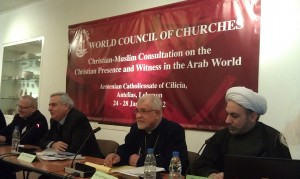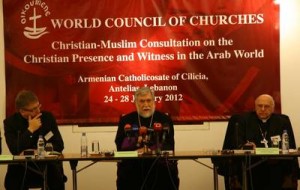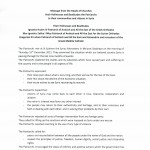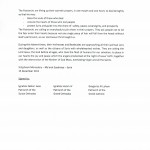The suffering in Syria has become horrifying and there is worse to come. It nevertheless remains quite difficult to determine the causes of the present situation and more difficult still to determine how other governments within the international community ought to respond.
Since last Saturday, when Russia and China engaged in a “double veto” of a UN Security Council resolution aimed at bringing some resolution to the conflict raging in Syria, news media in the United States have analyzed the national interests served by their joint decision. Speculation for why these countries would support the Syrian despot has included Russia’s desire to continue accessing Syria’s warm-water ports and the benefit both countries gain from unhindered access to Iran’s vast oil reserves. In any case, Ambassador Susan Rice described the vetoes as “disgusting” and “unforgiveable.”

Syrian forces tank moving along a road during clashes with the Syrian army defectors, in the Rastan area in Homs province, Jan. 30, 2012.
This surfeit of analysis aimed at Russia and China is remarkable primarily for the corresponding lack of analysis of why the United States is taking its own approach to the conflict. Even after the following Tuesday, when the Pentagon announced that plans for military intervention were being reviewed, most US media analysis remained focused on why Russia and China felt compelled to offer a minority report. What might we hear if media analysis in the United States worked from the (admittedly countercultural) presumption that US foreign policy is no less interest-driven than that of our rivals?
We might hear that the low, grumbling threat of US military intervention against a regime supported by Russia and China contains more than echoes of cold war containment policy, this time writ regional. We might hear that the larger US strategic goal in this revolutionary time is to contain the spread of Iranian influence.
Over the past year, many Christian friends in the Arab world have shared various versions of a conspiracy theory in which the United States does not fear but is rather aiding Islamist takeovers of governments in the region. While this possibility may be strange for many Americans to ponder, the theory accounts for what some may argue to be the national interest of the United States.
Facilitated by the previous administration’s failure in Iraq, Iran has enjoyed a bloc of influence stretching westward through Syria and Lebanon. The fall of Assad’s regime would limit Iran’s ability to project power throughout the region—by severing the Iranian connection to Hezbollah in Lebanon, for instance—a boon to both the State of Israel and the members of the Gulf Cooperation Council, Saudi Arabia chief among them.
It appears that the US, focused on preserving stability in the Gulf region, is confident in Saudi abilities to control the broad streams of Sunni Islamist impulses (as they have done in their own local context). Some would therefore argue that Islamist political orders, although antithetical to US ideologies, may be preferred as the enemy we know to the Iranian enemy we know all too well.
This observation is the mirror image of what many have pointed out as Russia’s geopolitical interest in weakening Sunni communities within the confederation. By propping up a nominally Shiite regime in Syria and thus bolstering Iran’s Shiite political order, Russia achieves the double aim of preserving its oil interests in Iran while crafting a counterbalance to Sunni groups within its own sphere of influence.
The current diplomatic tensions between the United States on one side with China and Russia on the other indicate that the Arab Spring has now become the new battleground for the Great Powers—those that remain and those on the rise. The geographic distinction confirms some elements of Huntington’s Clash of Civilizations thesis, though not his underlying theory of civilizational incompatibility. Access to petroleum trumps the civilizational divide.
At the same time, however, we are seeing evidence that the outworking of the Arab Spring will likely be accomplished quite apart from Great Powers influence. The heart of the current struggle in the Arab world is an internal conversation, a struggle between Sunnis and Shiites and between levels of accommodation for the secular west (including quasi-Communist ideologies). The outcomes of that struggle are quite unpredictable to persons embodying western ideologies. As much as Russia may try to preserve Shiite political power as a tool to balance Sunni insurgents and as much as the United States may try to limit Iranian influence by opening the door to populist Sunni Islamism, the volatility emerging from centuries of political manipulation at their hands is not easily controlled.
Russia is correct to warn that hasty regime change in Syria will lead to civil war and greater violence than we have already seen. Such a change will break the country in much the same way US policy left Iraq broken. US policymakers are confident that such a breaking will work toward a variety of US ends. Russia would benefit most from some version of the status quo. Both options are drenched in blood, and both fundamentally disregard the wellbeing of the Syrian people. And that, rather than the veto of a UN Security Council resolution, is both disgusting and unforgiveable.






